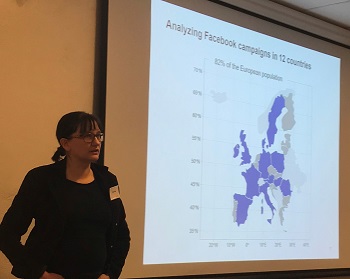
All News Articles
New publication – “Weaponizing Wedge Issues: Strategies of Populism and Illiberalism in European Election Campaigning on Facebook”
Jörg Haßler , Melanie Magin , Uta Russmann , Anna‐Katharina Wurst, Delia Cristina Balaban 4 , Paweł Baranowski, Jakob Linaa Jensen, Simon Kruschinski, Georgios Lappas, Sara Machado, Martina Novotná, Silvia Marcos‐García , Ioannis Petridis, Anda Rožukalne, Annamária Sebestyén, and Felix‐Christopher von Nostitz (2025). Weaponizing Wedge Issues: Strategies of Populism and Illiberalism in European Election Campaigning on Facebook. Media and Communication.Volume 13. Article 10718.
The 2024 European Parliament elections took place in extraordinary circumstances. Climate change, migration pressures and the war in Ukraine created what scholars now refer to as a “polycrisis”: overlapping crises that reinforce each other and generate fear, uncertainty and political instability. In such an environment, political parties sought new ways to mobilize voters, with many turning to Facebook as their primary battleground.
A new comparative study published in Media and Communication investigates how European political parties employed wedge issues to capture attention and frame debates on Facebook. Based on manual coding of 8,748 Facebook posts from 85 parties across 13 EU member states, the research reveals a troubling pattern: populist parties not only highlight wedge issues more frequently, but also systematically combine them with populist and illiberal rhetoric, which could have serious consequences for the future of liberal democracy.
What Are Wedge issues?
Wedge issues are topics that elicit strong emotional and moral responses, often causing divisions within coalitions and undermining political consensus. In the 2024 elections, three such issues stood out:
- Migration, which has long divided European electorates, especially since the so-called refugee crisis.
- Climate change, which has become increasingly politicized as the EU has advanced ambitious environmental policies.
- The war in Ukraine, raising existential questions about European security and relations with Russia.
These issues are not inherently negative for democratic debate. They are real policy challenges. However, when they are framed in a way that emphasizes division – for example, migration as a threat to national identity or security, climate policy as an elitist imposition or Ukraine as a distraction from “domestic concerns” – they become weapons of political mobilization.
What Is Digital Campaigning and Why Is It Strategically Beneficial for Parties?
Digital campaigning refers to the strategic use of online platforms, most notably social media, for electoral communication. Unlike traditional channels such as television or print, digital platforms allow political parties to bypass journalistic mediation and deliver unfiltered messages directly to citizens. From a strategic perspective, digital campaigning offers several key advantages:
- Control over framing: Parties can shape political issues according to their own interpretations, maintaining agenda-setting power without external constraints.
- Targeted communication: Digital tools allow messages to be tailored to specific voter groups, making mobilization more efficient.
- Speed and adaptability: social media enables immediate responses to political events, public debates or opponents‘ attacks – an especially valuable feature in times of rapid crises.
- Interactive engagement: Platforms encourage two-way communication, and citizens‘ reactions (e.g. likes, shares and comments) provide feedback and amplify party messages.
- Cost efficiency: Compared to mass media advertising, digital campaigning is relatively inexpensive, providing smaller or challenger parties with an opportunity to compete with more established parties.
For these reasons, digital campaigning has become indispensable in contemporary elections. However, as the study highlights, the very features that make digital campaigning advantageous for parties – speed, reach and flexibility – also make it susceptible to the amplification of divisive narratives and illiberal rhetoric.
How The Investigation Was Conducted?
The study, entitled Weaponizing Wedge Issues: Strategies of Populism and Illiberalism in European Election Campaigning on Facebook, is based on one of the most comprehensive cross-national analyses of digital campaigning in Europe to date. The research team collected a total of 8,748 Facebook posts published by political parties in 13 EU member states (Austria, Cyprus, Czech Republic, Denmark, France, Germany, Greece, Hungary, Latvia, Poland, Portugal, Romania, and Spain) during the month leading up to the 2024 European Parliament elections.
In order to ensure the comparability of the results, the researchers employed a uniform coding scheme across all participating countries. Each post was subjected to manual analysis, encompassing both the written text and the visual elements (images and videos), which have been shown to frequently convey critical rhetorical cues. The following variables were coded for:
- Wedge issues: Did they address migration, climate policy, or the war in Ukraine?
- Populist communication: Did they include references to “the people,” criticisms of “elites,” or the exclusion of outgroups?
- Illiberal rhetoric: Did they explicitly reject or undermine core values of the EU, such as pluralism, minority rights, or the rule of law?
Parties were categorized as populist or non-populist using well-established datasets (PopuList and the Chapel Hill Expert Survey). This allowed the team to compare how different types of parties used wedge issues and rhetorical styles.
Key Findings
The results provide clear evidence that populist parties approach digital campaigning in a different manner to their non-populist competitors.
- Populist parties were more active on Facebook.
On average, they posted nearly twice as often as non-populist parties, underlining the importance of social media for challengers seeking visibility. - Wedge issues appeared in about 16% of all posts.
While not dominating the campaigns, wedge issues played a significant role, particularly for populists who addressed them more frequently than non-populists. - Migration was the key battleground.
12% of populist posts focused on migration, compared to only 4% for non-populists.
When discussing migration, populist parties often framed it in existential terms—as a threat to security, culture, or national identity. - Rhetorical style mattered more than issue choice.
Populist parties not only selected wedge issues more often, but were also more likely frame these issues in polarizing ways and combine them with illiberal and populist rhetorical elements:- Among wedge-related posts, 65% of populist content included illiberal rhetoric, and 51% contained populist elements.
- Non-populist parties, by contrast, rarely used such strategies (12% illiberal, 18% populist).
Figure 1. Content categories in posts addressing wedge issues by party types with confidence intervals (𝑛 = 8,748 Facebook posts; 𝑛 = 1,362 Facebook posts containing wedge issues).
- Different issues encouraged different rhetorical strategies.
- Migration: Most strongly associated with illiberal rhetoric (73% of populist posts).
Climate policy: Often framed as an elite-driven burden, with illiberal rhetoric appearing in 59% of populist posts. - Ukraine: Less frequently addressed overall, but populist posts often linked it to anti-EU or anti-elite narratives.
- Migration: Most strongly associated with illiberal rhetoric (73% of populist posts).
Why This Matters For Democracy?
The findings suggest that wedge issues are not neutral campaign tools. In the hands of populist parties, they become Trojan horses for introducing illiberal rhetoric into mainstream debate. This process has several implications:
- Shifting the boundaries of discourse: When wedge issues are repeatedly tied to exclusionary framings, illiberal rhetoric becomes normalized.
- Forcing mainstream parties’ hands: Other actors may feel compelled to respond in similar terms, escalating polarization.
- Eroding democratic norms: By undermining pluralism and casting elites and minorities as enemies, these strategies weaken trust in democratic institutions.
In short, digital campaigning is not just about who sets the agenda, but about how issues are framed. By combining wedge issues with populism and illiberalism, parties can reorient democratic debate toward division rather than problem-solving.
CamforS at ICA 2023
This year’s International Communication Association (ICA) Conference was held from May 25-29 in Toronto, Canada. The CamforS network presented results from their research on digital campaign strategies during the conference. The talk by Simon Kruschinski compared the Facebook advertising strategies of mainstream and populist parties in 10 different countries during the 2019 European Parliamentary election campaign.
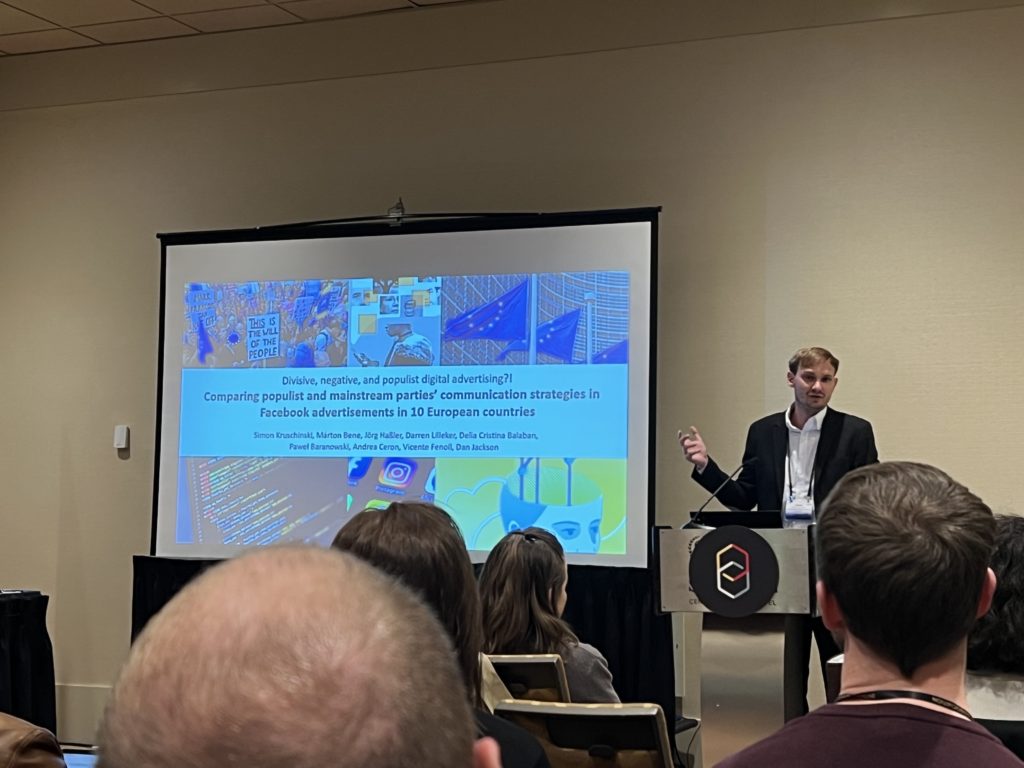
CamforS Book
OUT NOW: Our new book entitled „Campaigning on Facebook in the 2019 European Parliament Election. Informing, Interacting with, and Mobilising Voters“ has been published.
Haßler, J., Magin, M., Russmann, U. & Fenoll, V. (Hrsg.). (2021). Campaigning on Facebook in the 2019 European Parliament Election. Palgrave Macmillan. https://doi.org/10.1007/978-3-030-73851-8
This book investigates how political parties from 12 European countries used Facebook to inform, interact with and mobilise voters at the 2019 European Parliament election. Following a joint theoretical framework and method, the results of a content analysis of more than 14,000 Facebook posts are presented. Country specific chapters are followed by analyses of European parties’ Facebookcampaigning, the spread of populism and the use of Facebook ads by the parties.The final chapter compares all countries showing that campaigns are more strongly shaped by the national than by the European political context. Facebook is used for campaigning as usual; parties inform and persuade but neglect the platform’s mobilisation and particularly interactive affordances.
“This remarkable book is the outcome of an international collaborative endeavour. It clearly shows that social networks have finally become an integral part of European election campaigns. With its careful methodological design, the study impressively demonstrates the particular value of cross-border comparisons and the need for research to take the national context into account.”
—Christina Holtz-Bacha, Friedrich-Alexander University Erlangen-Nürnberg, Germany
“A timely and stimulating book covering recent European Parliament elections in twelve nations. The common methodological background produces sound and comparable results, and its comprehensive language and broad scope of cases make this book a perfect fit for researchers, policymakers and citizens attentive to social media’s role in elections.”
—Karolina Koc-Michalska, Audencia Business School, France
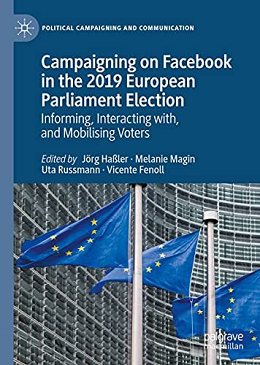
Denver 2021
The CamforS network is represented with two presentations at the 71st (Virtual) Annual Conference of the International Communication Association (ICA) taking place from 27-31 May 2021. The first presentation is held in the panel “Why Are You So Dirty? New Insights in Negative Campaigning” of the Political Communication Division by Simon Kruschinski and Pawel Baranowski. They present results on how European parties’ engage in negative campaigning and how this is influenced by parties’ ideology and their status as governing versus opposition party at the national level. In the second presentation in the panel “Politics and Social Media: Engagement, Exploitation, and Entertainment” of the Communication & Technology Division, Simon Kruschinski presents results on the extent to which user engagement may contribute to processes of polarization and fragmentation by showing that polarizing topics and styles result in more reactions, comments, and shares. In the presentation it is also explored how users’ receptivity to content-related factors is shaped by country context.
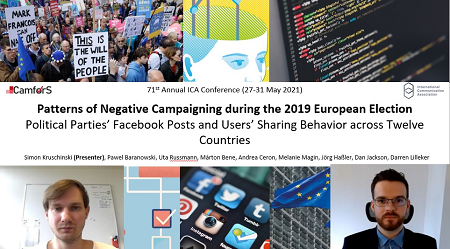
Zurich 2021
Katharina Schlosser presented recent results from CamforS on the personalization of campaign communication during the EP election campaign 2019 at the (virtual) DACH 21 conference in Zurich on April 8, 2021.
As part of a cross-national quantitative content analysis of Facebook posts in the context of the 2019 European elections, we asked the question how the campaign strategies of European and national parties differ in 12 European countries. In this context, we compared information and mobilization elements. Our results show that the overall strategy of all parties was to disseminate information, mobilization calls were used less. A closer look shows that the European parties communicated more align with the concept of “Spitzenkandidaten“ by publishing more information about frontrunners and calls to watch the TV-debates of the “Spitzenkandidaten“. In contrast, the national parties continued to focus on their own election campaigns, more independent of the party’s “Spitzenkandidaten“. All in all, it is apparent that not the entire political family, which includes the European party but also the national parties, seems to be behind the concept of “Spitzenkandidaten“. Since in the end none of the previously nominated “Spitzenkandidaten” was appointed EU Commission President, shows the lesser relevance of the concept as well.
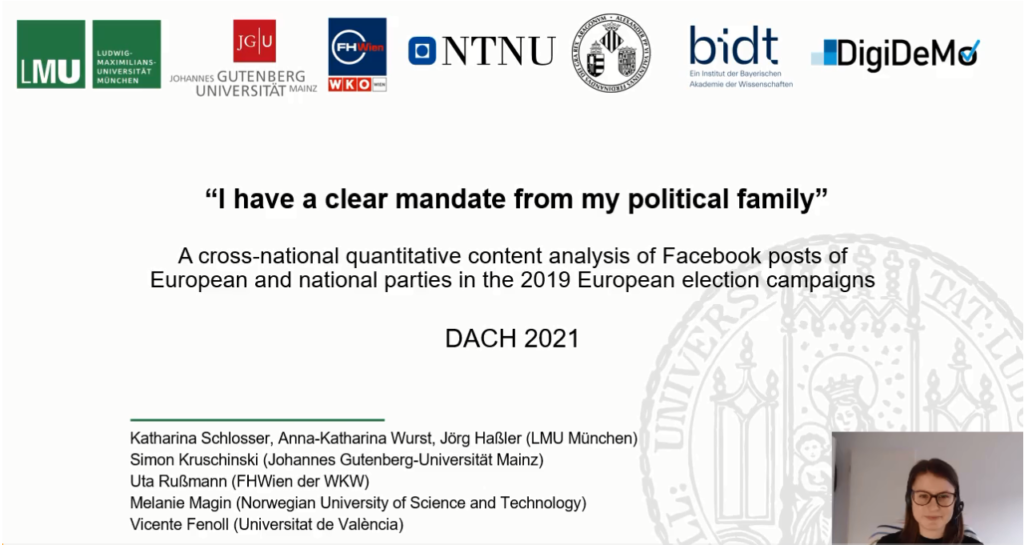
Bucharest 2021
Anna-Katharina Wurst presented a study of the CamforS team on parties‘ Facebook campaign strategies during the 2019 European Parliament election campaign at ECREA’s Political Communication Section Interim Conference 26 -27 March 2021 in Bucharest, Romania (virtual). The study analyzes the extent to which populist and non-populist parties as well as right-wing, left-wing and center parties used the campaign elements of information and mobilization in their Facebook posts. Results show that right-wing and populist parties used more calls for (offline) mobilization and focused more on their own party and representatives than the other parties. Non-populist and center parties tended to integrate information about the EU election in general in their Facebook communication, but without focusing on the European „Spitzenkandidaten“ concept, which indicates that the European idea was supported by the center parties, while the concept of lead candidates was not.
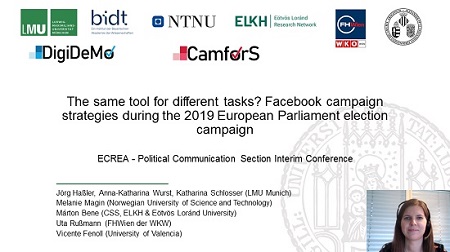
Mainz 2020
Jörg Haßler, Katharina Schlosser and Anna-Katharina Wurst of the bidt junior research group DigiDeMo were represented at the joint Annual Conference 2020 of the „Communication and Politics“ division of DGPuK (Deutsche Gesellschaft für Publizistik- und Kommunikationswissenschaft), the „Politics and Communication“ working group of the German Political Science Association (GPSA) and the „Political Communication“ section of the Swiss Association of Communication an Media Research (SACM) in Mainz. In a poster presentation, Katharina Schlosser – representing DigiDeMo, Melanie Magin and Simon Kruschinski – presented the first results of the analysis of AfD mobilization strategies on Facebook in the campaign for the 2019 European elections, which were then discussed together on the poster.
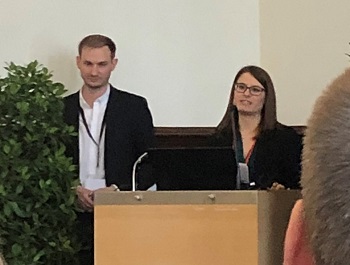
Valencia 2019
Melanie Magin, Márton Bene, Vicente Fenoll, Darren Lilleker, Andrea Ceron and Jörg Haßler presented the first findings of CamforS at the conference „European Elections 2019: Populism and Euroscepticism“ in Valencia from 20 to 22 November.
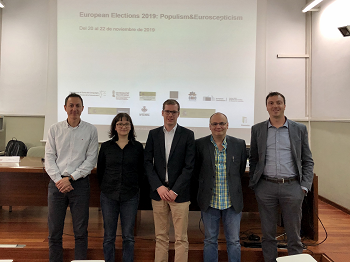
Trondheim 12-13 December 2019
On behalf of the whole project team, Melanie Magin presented CamforS as a project and some first findings at the interdisciplinary workshop „The Production of Participation in the Digital World” in Trondheim from 12 to 13 December 2019. Her presentation was entitled “How political parties tried to produce participation in the European Election Campaign 2019. A comparative content analysis of parties’ Facebook campaigns in 12 countries
